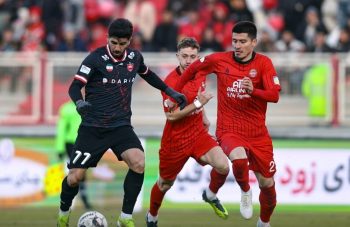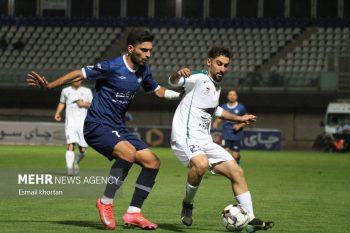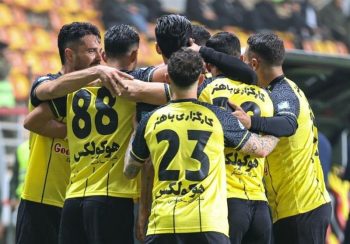Sanctions bite into Iran’s football World Cup dreams

thenational.ae, Yeganeh Salehi – TEHRAN, Less than three weeks before the World Cup kicks off, football-mad Iranians fear that national pride is at risk because of poor preparation blamed on a lack of funding, weak planning and political isolation.
“This is not our ideal team,” said Mojtaba Rahmatipour, 57, an office worker in Tehran.
“The government didn’t have any special plan for the team. Everything is about nuclear talks these days, but we know that everybody will watch our team in Brazil.
“We talk about football at home more than politics.”
Iranians love football and, with most other forms of recreation restricted by strict Islamic laws, sports take on added significance. Tehran’s Azadi stadium, with the capacity of more than 100,000, regularly sells out
The Iranian football team, known as “Team Melli”, is a source of great national pride, having been among Asia’s top sides since the late 1960s. They are currently ranked 34th in the world and first in Asia by Fifa.
The national squads for football and other sports rely on the government for the majority of their funding. But this has suffered as the coutry’s revenues have been cut in half by international sanctions over the past two years.
There was widespread rejoicing when Iran’s footballers qualified for the World Cup by beating longtime Asian rivals South Korea in Seoul last June.
The victory, just three nights after the surprise election of Iran’s reform-minded president Hassan Rouhani, led to massive celebrations that combined the political and sporting hopes of millions of Iranians.
But in the 11 months since, Team Melli has played only four mandatory qualifying matches for the 2015 Asian Cup – against Thailand (twice), Lebanon and Kuwait – and a few friendlies with low-ranking teams such as Guinea, Belarus and Montenegro.
They are scheduled to play a final warm-up game, against Trinidad and Tobago on June 8, only five days before the World Cup kicks off, and even the players feel they have not had enough preparation.
“None of the promises turned into realities,” said Javad Nekounam, Iran’s captain.
“If we did not have good preparation games until the games start, there shouldn’t be any expectations. Whatever happens, the authorities must be held responsible for the results.”
The lack of funds has led to embarrassment for the players as well. The Iranian Football Federation opted to order cheap, poor quality kits, and the federation’s president, Ali Kafashian, was reported to have told the players to wash them in cold water to avoid shrinkage. He also told players not to exchange shirts with opponents in Brazil, a common gesture of sportsmanship, as they do not have enough, Iranian media reported.
The government-run federation has said the shortage of funds was because the nuclear-related sanctions prevented it from collecting US$300,000 (Dh1.1 million) from international sponsors.
Plans for a training camp in Portugal, the home of Iran’s coach, Carlos Queiroz, and more prepatory games were also cancelled for financial reasons.
“Our camps were organised without any plans or discipline,” said Asghar Sharafi, a former national team coach. “Our team should have played friendly games with major teams to overcome the players’ nervousness, but we didn’t have the budget for that.”
Some foreign teams have also avoided playing in Iran because of political tensions, according to Iranian sports analysts.
“None of the major teams was eager to play with Iran, mostly fearing possible impact of political sanctions,” said Adel Ferdosipour, Iran’s most prominent football commentator.
Team Melli finally managed to hold training camps in South Africa in April and in Austria this month.
However, the South African camp was marred by a dispute between the football federation and Iran’s top teams because it coincided with the Asian Champions League, the continent’s top club competition. Team owners blocked some of their players from attending the camp.
The result was disapointing to Team Melli fans, as only 11 players showed up for the South Afria camp. And in Austria, the team managed only goalless draws in games against Belarus and Montenegro.
Queiroz, a former coach of Real Madrid and assistant coach at Manchester United, has also voiced unhapiness with the team’s preparation.
“Those who think Iran’s national team will be successful with only 14 days of preparation, are either crazy or are living in Disneyland,” he said recently.
However, the team could still be a force in Brazil, he said.
“If we plan a good preparation programme for the team in accordance with reality, then we can expect to go to the second round.”
Iran has never progressed beyond the group stage in its three previous appearances in the tournment. It kicks off its 2014 campaign on June 16 with a game against Nigeria, the current African champions, before playing Argentina, ranked 7th by Fifa, and Bosnia and Herzegovina, ranked 25th.
Despite doubts about the team’s preparedness, some diehard fans supporters plan to make the long trip to Brazil regardless of the expense.
In fact, the exotic South American host country has only fuelled their enthusiasm.
“I’m going there to support them, but it is also Brazil,” said Hesam Davoodi, 33, who also went to the 2010 World Cup in South Africa. “How many Iranians do you know that have ever been to Brazil?”
And while funding might be short, at least one government official involved in negotations over the nuclear programme is making time to focus on football.
Mohammad Javad Zarif, the foreign minister, visited a Team Melli practice session this month and tweeted a photo with the caption: “Thrilled to meet our boys on field. Asked them to do their best to secure victory in July, they asked me the same,” referring to the tournament coinciding with a deadline to resolve the deadlock over Iran’s nuclear programme.




